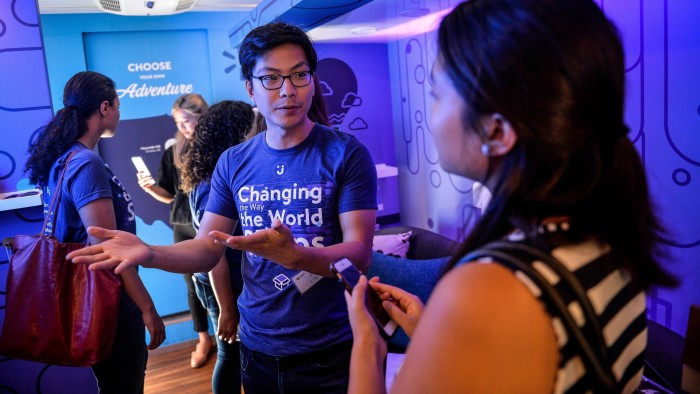How to get the most out of university recruitment events

Roula Khalaf, Editor of the FT, selects her favourite stories in this weekly newsletter.
I had a final-year dissertation to plan, lectures to attend and lots of reading to do. So why did I take time out last term to sip champagne and eat pizza with strangers?
It was the university recruitment season when final-year students balance job hunting against the demands of their academic routine. Love-bombing by big bank and consultancy recruiters starts the minute you set foot on campus. During the past three years of my course, I have been offered free pizza, champagne, afternoon tea, port and coffee as well as bike clinics, without ever expressing an interest in a banking career. I soon realised that, unless I was willing to spend my degree permanently — if affordably — inebriated, I had to be selective about which events to attend.
You cannot fault the imaginative labels the companies use to make their events appealing — “symposium” and “interactive workshop” being just two. Ultimately, however, it is the ones offering to teach you a skill, such as how to code, that are the most attractive. Even if you end up not applying for a job with that company, you will not feel you wasted your time.
Among all these corporate events, one technology company stood out with its offer of a private performance by a famous comedian — also an alumnus of the university. The room was full and it was obvious many people had decided that handing over their personal information and listening to a 10-minute talk about the company was a small price to pay for attending an exclusive live comedy show.
Celebrity marketing works. The tech company attracted 100 students to interviews on just one day.
The creative industries’ events, on the other hand, might be short on pizzas and comedians, but you are more likely to meet professionals who share advice and even contacts. For many students, it is their first look at networking turned into a professional art: they sign their emails “VBW” — very best wishes — capitalise random words and are extra enthusiastic about “linking up” and “reaching out”.
My university careers advice centre runs a networking workshop, where we have learnt that anything from a student society to a house party is an opportunity to network. It is meant to reassure us that we are already able to network without being, or appearing to be, ruthlessly ambitious. This notion sends a friend who “hates networking” spinning into paranoia. “So, everyone in my life is using me?” she says. “Are you using me too?”
Recruiters be warned: labelling any event as a “networking opportunity” is enough to put some students off attending.
Careers fairs, crammed with information stalls staffed by companies’ representatives, are the prime example. Many students feel there is no point going unless you have read up on the companies beforehand and thought up a few intelligent questions to make recruiters remember you as that insightful, well-informed one. That is a lot of preparation time, which final-year students might not have.
One of the best ways recruiters can ease the pressure is to have recent graduate appointees on hand. At fairs, they tend to attract the most students, probably because the graduates themselves are not senior enough to be judging you based on your questions and are already in the job for which you might be applying. You are not under pressure to give the impression that working for their company is your one goal in life, plus you are more likely to trust their advice.
Overall, however, the events I have been most tempted to attend are women-only. They are usually smaller more relaxed, and often led by women who are senior in their organisations and seem genuinely eager to advise. Perhaps it is because these events are smaller that they are often a little swankier: Chelsea buns over Jammie Dodgers, or even champagne over prosecco.
However flattering it is to be sweet-talked by an investment bank, the women who do apply for the jobs may yet feel wary.
Attendees of those women-only events know it is probably no longer at the recruitment stage that they will face discrimination, but further down the line when they want to start a family. Some are also concerned that women-only networking events exist only as a pale female equivalent of the old boys’ club, instead of proof that the club is on its way out.
The author is a final year student at a UK university
Comments